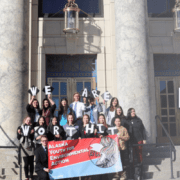That’s All Folks!
The first round of the 33rd Alaska State Legislature is neatly wrapped up, and our lawmakers and their staff are integrating back into the civilian world for the summer. The drama, bruised sentiments, blather, tweets, accusatory statements, pointed fingers, shouts, and slammed doors of the winter session grow less poignant by the day. Alaska Spring has a way of interceding in human affairs. The anger a lawmaker may carry about a bill not getting its due treatment in committee is sure to be unsettled by the ancient cry of a sandhill crane, the smell of cottonwood buds on the wind, or the moose calf ambling across the highway ahead. (Watch out!)
There is a lot that these folks should be proud of as they fade out of the spotlight and into the summer fray. The legislature passed a significant investment into public education – the largest ever in state history. They passed legislation establishing the month of October as Filipino American History Month; they passed legislation to regulate the use and disposal of the “forever chemical” PFAS found in firefighting foams; they began work on a state Renewable Portfolio Standard to have utilities sell 80% renewable generated electricity by 2040; a Community Solar bill was introduced to allow more Alaskans the benefits of low-cost solar power; an omnibus election bill was heard which would allow greater access to the voting process; the state’s Renewable Energy Grant fund was extended indefinitely, and numerous clean energy projects were funded. Necessary for our salmon habitat, the legislature did not allow a state take-over of wetland development permitting duties, which would have led to decreased oversight.
The design of our Democracy serves to slow-roll, often for the best, so we are not surprised that few bills passed this spring. The process is messy, and the 33rd Alaska State Legislature is a completely imperfect and exhausting bundle of humanity, and we love it. It may not be the most remarkable legislature, but Ranked Choice Voting has produced a huge crop of freshmen and moderates, which benefits the state’s health. Alaska has enormous problems, from suicide rates to climate change, and getting away from partisan divisions is crucial. What the 33rd does next session hopefully will be a step toward the betterment of Alaska. It is time that the Governor, the Senate Bi-Partisan Majority, and the House Mish-Mash-Maybe-Majority put their collective shoulder to the wheel and work on a plan.
Whether the legislature is in session or not, our plan at The Alaska Center is to continue advocating for increased voting rights and voting access, increased renewable energy production, and increased equity and justice – in schools, workplaces, homes, and everywhere else. We will fight to protect salmon from habitat loss, climate change, and bycatch.
We will keep our eyes on the horizon for a special session on some broad-based tax proposal, rumored to be scheduled for September or October. We truly appreciate all of the support and feedback you have provided and the work you have put in this session reaching out to lawmakers on issues important to you. Constituent contact is vital to an elected official, even if they don’t give you the answer you may want to hear or any answer at all.
Never ever, ever give up.
Herein follows a brief note from the author (who is headed out to Bristol Bay for gillnetting soon and will be departing The Alaska Center for future pursuits):
“I appreciate you all, and have learned more over the past eight years at The AK Center than I have space to put in words right here in this email/blog. There is no easy way to define the work of this organization. What I can say is this is a non-profit that seeks to empower youth to fight for things that will help them live lives of abundance.
You can always reach out to me directly at louieflora@hotmail.com.
Be excellent to each other,”
Louie Flora/The Alaska Center









